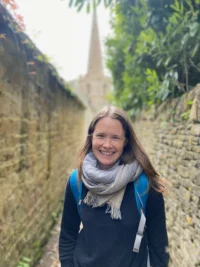Kristen Case Examines Thoreau and Time

In this year’s Dana S. Brigham Memorial Lecture, Kristen Case examined Thoreau’s rich legacy as it relates to his and our experience of time. Her book Keeping Time: Henry David Thoreau’s Kalendar is forthcoming in 2025. View her keynote lecture at Minuteman Media Network.
“At Walden Pond Thoreau designed a life and economy outside the constraints of clock time, a way of being in which both place and time were changed. Connecting his own daily habits to the rhythms of the natural world, Thoreau discovered that time was plastic, that he could experience the distant past alongside the present, that he could live in the cyclical unfolding of perennial phenomena.”
“If on my hands and knees in the garden, I pulled at the pile of papery stuck-together leaves, bleached and dry on top, black and wet underneath, I would see little green shoots fighting upward from the still cool earth. Who taught us this about the palimpsest of dead leaves and the green shoots and the cool earth? On what calendar day did we learn it?”
Kristen Case lives and teaches in Farmington, Maine. An award-winning author, editor, and poet, she he is co-Director of the New Commons Project, a public humanities initiative sponsored by the Mellon Foundation, and Director of Thoreau’s Kalendar: A Digital Archive of the Phenological Manuscripts of Henry David Thoreau.
